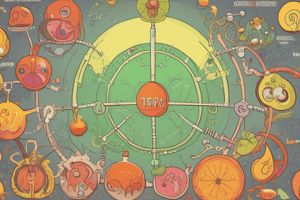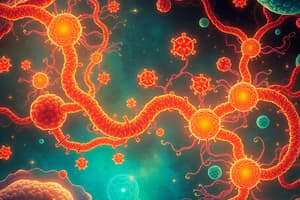Podcast
Questions and Answers
What reaction does GTP participate in to form ATP?
What reaction does GTP participate in to form ATP?
GTP can donate its phosphoryl group to ADP to form ATP.
What role does succinate dehydrogenase play in the citric acid cycle?
What role does succinate dehydrogenase play in the citric acid cycle?
Succinate dehydrogenase catalyzes the oxidation of succinate to fumarate.
How does malonate affect the citric acid cycle?
How does malonate affect the citric acid cycle?
Malonate is a competitive inhibitor of succinate dehydrogenase, blocking the citric acid cycle.
What products are generated from one turn of the citric acid cycle?
What products are generated from one turn of the citric acid cycle?
What is the impact of arsenic poisoning on the citric acid cycle?
What is the impact of arsenic poisoning on the citric acid cycle?
Which amino acids can α-ketoglutarate and oxaloacetate serve as precursors for?
Which amino acids can α-ketoglutarate and oxaloacetate serve as precursors for?
What is the significance of fumarase in the citric acid cycle?
What is the significance of fumarase in the citric acid cycle?
How is L-malate oxidized in the citric acid cycle?
How is L-malate oxidized in the citric acid cycle?
What is the primary function of the citric acid cycle in cellular respiration?
What is the primary function of the citric acid cycle in cellular respiration?
What are some symptoms of PDH deficiency?
What are some symptoms of PDH deficiency?
Which two reduced electron carriers are generated during the citric acid cycle?
Which two reduced electron carriers are generated during the citric acid cycle?
Why is the E1 defect classified as X-linked dominant?
Why is the E1 defect classified as X-linked dominant?
How is pyruvate transported to the mitochondria for the citric acid cycle?
How is pyruvate transported to the mitochondria for the citric acid cycle?
What dietary measures can help reduce symptoms of PDH deficiency?
What dietary measures can help reduce symptoms of PDH deficiency?
What is produced alongside acetyl-CoA during the conversion of pyruvate?
What is produced alongside acetyl-CoA during the conversion of pyruvate?
What is the first step in the Citric Acid Cycle?
What is the first step in the Citric Acid Cycle?
What are the three distinct enzymes that make up the pyruvate dehydrogenase complex?
What are the three distinct enzymes that make up the pyruvate dehydrogenase complex?
How does aconitase affect the Citric Acid Cycle?
How does aconitase affect the Citric Acid Cycle?
Why is the citric acid cycle considered a common pathway in metabolism?
Why is the citric acid cycle considered a common pathway in metabolism?
What role does the citric acid cycle play in gluconeogenesis?
What role does the citric acid cycle play in gluconeogenesis?
What role does isocitrate dehydrogenase play in the TCA cycle?
What role does isocitrate dehydrogenase play in the TCA cycle?
What type of reaction does the pyruvate dehydrogenase complex catalyze?
What type of reaction does the pyruvate dehydrogenase complex catalyze?
What is produced when α-ketoglutarate is converted to succinyl-CoA?
What is produced when α-ketoglutarate is converted to succinyl-CoA?
What is coupled with the conversion of succinyl-CoA to succinate?
What is coupled with the conversion of succinyl-CoA to succinate?
What are the five coenzymes required by the Pyruvate Dehydrogenase Complex?
What are the five coenzymes required by the Pyruvate Dehydrogenase Complex?
What serious condition can arise from thiamine deficiency?
What serious condition can arise from thiamine deficiency?
What is the role of PDH kinase in the regulation of the PDH complex?
What is the role of PDH kinase in the regulation of the PDH complex?
How does calcium affect PDH phosphatase?
How does calcium affect PDH phosphatase?
What condition is associated with a deficiency of the E1 component of the PDH complex?
What condition is associated with a deficiency of the E1 component of the PDH complex?
What happens to brain function in cases of pyruvate dehydrogenase deficiency?
What happens to brain function in cases of pyruvate dehydrogenase deficiency?
What are the allosteric activators of the pyruvate dehydrogenase complex?
What are the allosteric activators of the pyruvate dehydrogenase complex?
What is the effect of elevated pyruvate levels in the blood?
What is the effect of elevated pyruvate levels in the blood?
Flashcards are hidden until you start studying
Study Notes
Citric Acid Cycle Overview
- Also known as Krebs cycle or tricarboxylic acid cycle (TCA), it is a crucial part of cellular respiration occurring in mitochondria.
- Involves oxidation of acetyl-CoA, producing CO2 and conserving energy as NADH and FADH2.
- Functions as a common pathway for aerobic oxidation of carbohydrates, lipids, and proteins.
Transport and Production of Acetyl-CoA
- Pyruvate from glycolysis is transported into mitochondria via a pyruvate/H+ symport.
- Pyruvate is oxidized to acetyl-CoA and CO2 by the pyruvate dehydrogenase (PDH) complex.
- The process involves oxidative decarboxylation, removing the carboxyl group from pyruvate.
Components of the Pyruvate Dehydrogenase Complex
- Comprises three enzymes: E1 (pyruvate dehydrogenase), E2 (dihydrolipoyl transacetylase), E3 (dihydrolipoyl dehydrogenase).
- Requires five coenzymes: thiamine pyrophosphate (TPP), flavin adenine dinucleotide (FAD), coenzyme A, nicotinamide adenine dinucleotide (NAD), and lipoate.
- Thiamine deficiency can lead to serious neurological issues (e.g., Beriberi).
Regulation of Acetyl-CoA Production
- Allosteric activation occurs when AMP, CoA, and NAD+ levels rise.
- PDH complex can be inactivated by phosphorylation of E1 by PDH kinase, which is activated by ATP, acetyl-CoA, and NADH.
- Calcium ions activate PDH phosphatase, reversing E1 inactivation.
Pyruvate Dehydrogenase Deficiency
- E1 deficiency linked to congenital lactic acidosis causes pyruvate accumulation and subsequent lactic acid buildup.
- Neural effects include neurodegeneration and muscle spasticity; neonatal forms can be fatal.
- Condition is X-linked dominant and lacks proven treatments, though dietary changes may help.
Reactions of the Citric Acid Cycle
- Eight steps involved, starting with acetyl-CoA combining with oxaloacetate to form citrate.
- Citrate is converted to isocitrate, followed by oxidative decarboxylation to form α-ketoglutarate.
- Further steps convert α-ketoglutarate to succinyl-CoA, then to succinate, followed by oxidation to fumarate, hydration to malate, and oxidation back to oxaloacetate.
Energy Yield of the Citric Acid Cycle
- One turn of the cycle yields 3 NADH, 1 FADH2, 1 ATP (or GTP), and 2 CO2.
- Total energy yield from one acetyl-CoA can reach 12 ATP equivalents.
Arsenic Poisoning
- Arsenic inhibits enzymes dependent on lipoic acid, notably impacting the PDH complex.
- Leads to pyruvate accumulation, similar in effect to PDH deficiency, causing neurological damage.
Biosynthetic Importance of Cycle Intermediates
- α-Ketoglutarate and oxaloacetate serve as precursors for amino acids through transamination reactions.
Studying That Suits You
Use AI to generate personalized quizzes and flashcards to suit your learning preferences.




